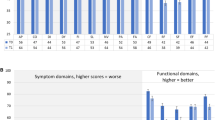Summary
The Functional Assessment of Chronic Illness Therapy (FACIT) measurement system is a collection of 27 quality of life (QOL) scales, with several more in development, targeted at the management of chronic illnesses including cancer (FACT), human immunodeficiency virus (HIV) infection (FAHI), and multiple sclerosis (FAMS). The core FACIT scale (FACT-G) consists of a general questionnaire with 27 items related to four dimensions of health: physical, functional, social, and emotional well-being. There are also symptom- and treatment-specific scales as well as assessments for other areas of concern (e.g. spirituality and palliative care). Many of the questionnaires are available in over 30 languages. The validity, reliability, and the sensitivity to change in health status over time of the FACIT questionnaires have been well documented. Currently, the FACIT scales have been implemented in Phase II and III clinical trials and other cancer-related treatment evaluations. Future efforts in improving the FACIT measurement system include identification of items that are sensitive to specific patient populations, collection of data to establish national normative and bench mark scores, construction of a QOL item bank, and development of computerized adaptive testing programmes (CAT) to measure precisely a given concept based on ongoing responses.




Similar content being viewed by others
References
Moore MJ, Osoba D, Murphy K, Tannock IF, Armitage A, Findlay B, Coppin C, Neville A, Venner P, Wilson J. Use of palliative end points to evaluate the effects ofmitoxantrone andlow-dose prednisonein patients with hormonally resistant prostate cancer. J Clin Oncol 1994; 12:689–94.
Cella DF. Measuring quality of life in palliative care. Semin Oncol 1995; 22(2 Suppl 3):73–81.
Chang C, Bresnahan B, Gagnon D, Lent L, Zagari M, McNulty P, Vercammen E, Cella D. Cross-language validation of the Functional Assessment of Cancer Therapy — Anemia (FACT-An) questionnaire. Eur J Cancer 1999; 35 (Suppl 4):S359.
Chang C-H, Cella D. Equating health-related quality of life instruments in applied oncology settings. Physical Medicine and Rehabilitation: State of the Art Reviews 1997; 11:397–406.
Author information
Authors and Affiliations
Rights and permissions
About this article
Cite this article
Cella, D. Assessment methods for quality of life in cancer patients: the FACIT measurement system. International Journal of Pharmaceutical Medicine 14, 78–81 (2000). https://doi.org/10.2165/00124363-200004000-00007
Received:
Accepted:
Published:
Issue Date:
DOI: https://doi.org/10.2165/00124363-200004000-00007




